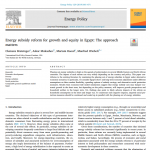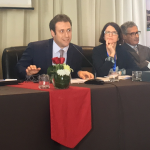Clemens Breisinger, Askar Mukashov, Mariam Raouf, and Manfred Wiebelt
Phasing out energy subsidies is high on the agenda of policymakers in several Middle Eastern and North African countries. The impact of such reform can vary widely depending on the country and policy. This paper contributes to the existing literature by examining the phasing out of energy subsidies in Egypt under alternative economic scenarios.





